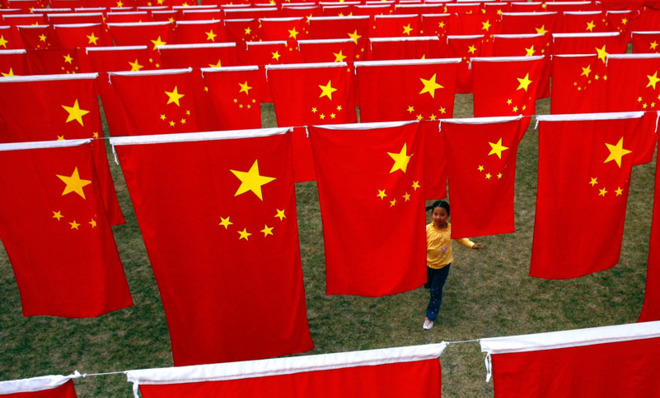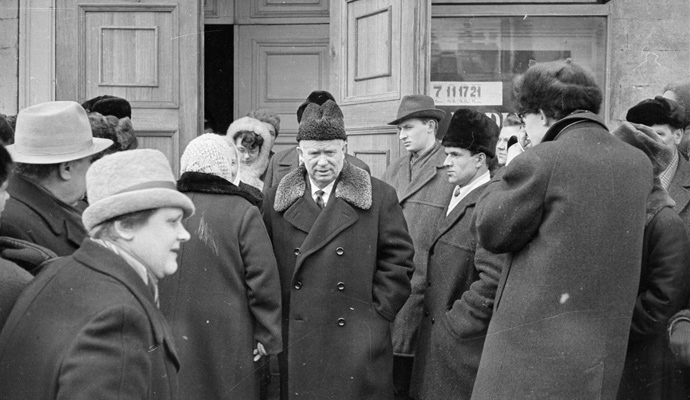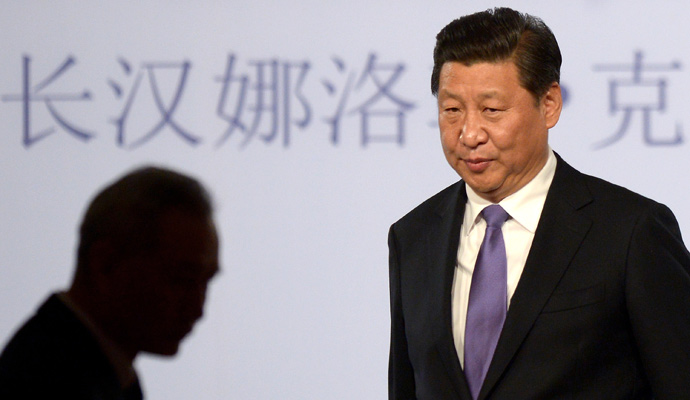Ozymandias in Beijing
Contrary to what you might think, the Chinese Communist Party is going to crumble one day

A free daily email with the biggest news stories of the day – and the best features from TheWeek.com
You are now subscribed
Your newsletter sign-up was successful

Nothing lasts forever, not even the Chinese Communist Party. Whether it will perish in a few years, or last for decades to come, there are a series of worrying indicators. Beijing has been slow to implement reforms that will orient the economy on a sustainable path. President Xi Jinping is knee-deep in an anti-corruption campaign against senior Chinese Communist Party (CCP) members unprecedented in its reach and scope in modern China, raising concerns about the party's ability to police itself. Meanwhile, outside the corridors of power, China's increasingly sophisticated populace is concerned with pollution, freedom of speech, and the country's relationship with its neighbors, especially Japan. It's impossible to predict the future, of course, and the CCP overcame greater challenges following Mao's death in 1976 and after the Tiananmen Square protests in 1989. But six months shy of the Communist Party's 65th anniversary of ruling China, it's worth emphasizing that the party and China are not the same thing — China predates the party, and will outlast it.
Russia's Communist Party, which molded the Soviet Union into its own image and dominated it from the union's 1922 formation to its 1991 dissolution, offers the best cautionary tale for the party. But in looking for ways to forestall the inevitable, the party may want to also study the experience of a government further afield: that of the Institutional Revolutionary Party, commonly known by its Spanish initials as PRI, which ruled Mexico from 1929 to 2000. Mexico under the PRI was not only the longest running one-party state of the 20th century, the PRI also fared well after losing power. Today, the Russian Communist Party is in shambles; its saints and leaders — Lenin, Stalin, Brezhnev — have been disgraced. The PRI elite, on the other hand, faced relatively little backlash after they lost power in 2000. And in a relatively free and far election, Mexicans voted the PRI back into power in 2012 — an ideal consolation prize for a party that formerly monopolized power.
While the CCP and PRI structurally and ideologically are very different, the experiences they fostered, and the situations they find themselves in, have some striking similarities. The USSR on the eve of its collapse was an empire, overextended from an arms race with the United States and reeling from a 10-year quagmire in Afghanistan. Poverty was rampant, international travel was restricted, and Moscow's autarkic economy meant domestic products were shoddy and foreign goods were scarce. By contrast, Mexico and China were (and are) healthily integrated into global markets. Mexico's economy in the decade leading up to the PRI's fall from power, despite an economic crisis in the mid-1990s, kept expanding healthily, as China's continues to do. While much of the Soviet Union's leadership in the 1970s and 1980s was stunningly incompetent, China today and Mexico under the PRI were ruled by competent technocrats. (In 1990, Nobel Prize-winning author Mario Vargas Llosa called Mexico a "perfect dictatorship" — faint praise that could be applied to China as well.)
The Week
Escape your echo chamber. Get the facts behind the news, plus analysis from multiple perspectives.

Sign up for The Week's Free Newsletters
From our morning news briefing to a weekly Good News Newsletter, get the best of The Week delivered directly to your inbox.
From our morning news briefing to a weekly Good News Newsletter, get the best of The Week delivered directly to your inbox.
Beijing's mostly measured authoritarianism after the death of Mao in 1976 is more similar to Mexico in the 1980s and 1990s than the brutal repression that characterized most of the Soviet Union's history. And a corruption crackdown in the 1990s against Raul Salinas, whose brother Carlos had just stepped down from the presidency, exposed the breathtaking corruption and the splintering of the Mexican elite — not unlike the current corruption scandal involving former security czar Zhou Yongkang, which may do the same thing for China.

Yet the CCP continues to fixate on comparisons with the shambolic USSR. A six-part party-made documentary about the Soviet Union's collapse, based on a 2012 book, has recently been shown at dozens of political meetings. The movie begins with a narrator warning, "On the eve of the 20th anniversary of the death of the Soviet Union and its party, we are walking on the same ground." And in a December 2012 speech, Xi reportedly told party insiders. "Why did the Soviet Union disintegrate? Why did the Soviet Communist Party collapse? An important reason was that their ideals and convictions wavered." But by obsessing over the USSR, "I think they're looking at the wrong example," says Jorge Guajardo, who served as Mexico's ambassador to China from 2007 to 2013. In hindsight, he told Foreign Policy, "living in China on a daily basis felt like living in Mexico under the PRI."
Guajardo remembers watching the celebrations for the 60th anniversary of the Chinese Communist Party on Oct. 1, 2009, held on the Avenue of Eternal Peace in central Beijing. The celebrations — meant to communicate longevity and legitimacy — featured a military parade of 10,000 troops, where then-Chinese President Hu Jintao declaimed the oft-spoken slogan "gongchandang wansui" — literally, "Ten thousand years for the CCP." The CCP's confidence — and that of his fellow ambassadors, who seemed to believe that that the CCP would govern in perpetuity — reminded Guajardo of the PRI. "Everyone agreed that Mexico was governed by one party, and that it would be that way forever," he said. (In 1995,Guajardo joined the opposition National Action Party [PAN], whose victory in the 2000 elections ended the PRI's monopoly on power.)
The similarities between the widely held assumption that China is the party and the party is China reminded him of a time, in the not-too-distant past, when there was no daylight between the PRI and Mexico. Guajardo, who's now a senior director at McLarty Associates, a Washington, D.C.-based consultancy, started noticing other comparisons. The dissatisfaction with the government's handling of a massive earthquake in Sichuan in 2008 helped spur the growth of civil society, which reminded him of the 1985 Mexico City earthquake, "which laid bare the PRI's corruption, lack of transparency, and inefficiency," he said in a January 2014 speech.
A free daily email with the biggest news stories of the day – and the best features from TheWeek.com
And just as the PRI fought corruption by going after the "big fish," Xi has vowed to go after "tigers and flies" — both high-ranking and low-ranking corrupt officials.
"On economic, political, and social dimensions — in some ways they're very similar," says Li He, a professor at Merrimack College in Massachusetts and author of the book From Revolution to Reform: A Comparative Study of China and Mexico. Both countries, Li said, faced wrenching peasant revolutions before a strong, single party unified the country. Both adapted liberal economic reforms both domestically and internationally — Mexico joined NAFTA in 1994, China entered the WTO in 2001, nearly 25 years after it began its comprehensive Reform and Opening policy.

The PRI lost power in 2000, "but until the 1990s, it was completely laughable to be in the opposition," Guajardo said. "You were seen as a loser who couldn't get a real job. Same in China."
Guajardo recalls a 2008 meeting in Beijing between Enrique Peña Nieto, then a state governor and now the first post-2000 PRI president of Mexico, and an official from China's Communist Party who focused on Latin American affairs: "The first question they asked was, 'Why did the PRI lose power?' Nieto responded, 'The tiredness of the system. Since we were the single party in power, we were blamed for everything.'" (Nieto's spokesperson couldn't be reached for comment.)
There are many obvious areas of difference between the two political parties and their experiences. China's population of 1.3 billion people, is of course far larger than Mexico's 120 million. And Mexico under the PRI held (and rigged) presidential elections — and Beijing doesn't hold national elections. Believing that the CCP can learn from the experiences of the PRI is decidedly not a mainstream view in China. While many countries face problems like corruption and a widening gap between rich and poor, "this of course doesn't mean that what happened in Mexico will happen in China," says Jiang Shixue, the deputy head of the Latin American Studies Center at the Chinese Academy of Social Sciences, the country's top think-tank. Chinese party press occasionally write articles about why the PRI lost power, but comparing China to the USSR is far more common.
An article about China's current anti-corruption campaign published on the website of CCP journal Seeking Truth in January summed up the lessons to be learned from the Soviet Union: "If corruption cannot be effectively controlled, the people will eventually no longer recognize [the validity] of the ruling party." The conviction learned from the failure of the Soviet Union seems to be that rooting out corruption will ensure the people remain faithful to the CCP. But what lessons can be learned from Mexico? "I would tell Xi to stop the anti-corruption campaign," says Guajardo. "The system is built on corruption. Get used to it, own up to it."
Perhaps the best lesson is that all political parties lose power eventually. "No one for a second assumed you can have Mexico without the PRI," said Guajardo. "But you could."
More from Foreign Policy...
-
 Political cartoons for February 20
Political cartoons for February 20Cartoons Friday’s political cartoons include just the ice, winter games, and more
-
 Sepsis ‘breakthrough’: the world’s first targeted treatment?
Sepsis ‘breakthrough’: the world’s first targeted treatment?The Explainer New drug could reverse effects of sepsis, rather than trying to treat infection with antibiotics
-
 James Van Der Beek obituary: fresh-faced Dawson’s Creek star
James Van Der Beek obituary: fresh-faced Dawson’s Creek starIn The Spotlight Van Der Beek fronted one of the most successful teen dramas of the 90s – but his Dawson fame proved a double-edged sword
-
 The billionaires’ wealth tax: a catastrophe for California?
The billionaires’ wealth tax: a catastrophe for California?Talking Point Peter Thiel and Larry Page preparing to change state residency
-
 Bari Weiss’ ‘60 Minutes’ scandal is about more than one report
Bari Weiss’ ‘60 Minutes’ scandal is about more than one reportIN THE SPOTLIGHT By blocking an approved segment on a controversial prison holding US deportees in El Salvador, the editor-in-chief of CBS News has become the main story
-
 Has Zohran Mamdani shown the Democrats how to win again?
Has Zohran Mamdani shown the Democrats how to win again?Today’s Big Question New York City mayoral election touted as victory for left-wing populists but moderate centrist wins elsewhere present more complex path for Democratic Party
-
 Millions turn out for anti-Trump ‘No Kings’ rallies
Millions turn out for anti-Trump ‘No Kings’ ralliesSpeed Read An estimated 7 million people participated, 2 million more than at the first ‘No Kings’ protest in June
-
 Ghislaine Maxwell: angling for a Trump pardon
Ghislaine Maxwell: angling for a Trump pardonTalking Point Convicted sex trafficker's testimony could shed new light on president's links to Jeffrey Epstein
-
 The last words and final moments of 40 presidents
The last words and final moments of 40 presidentsThe Explainer Some are eloquent quotes worthy of the holders of the highest office in the nation, and others... aren't
-
 The JFK files: the truth at last?
The JFK files: the truth at last?In The Spotlight More than 64,000 previously classified documents relating the 1963 assassination of John F. Kennedy have been released by the Trump administration
-
 'Seriously, not literally': how should the world take Donald Trump?
'Seriously, not literally': how should the world take Donald Trump?Today's big question White House rhetoric and reality look likely to become increasingly blurred